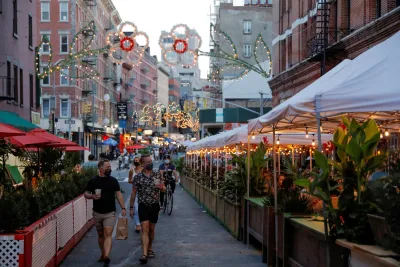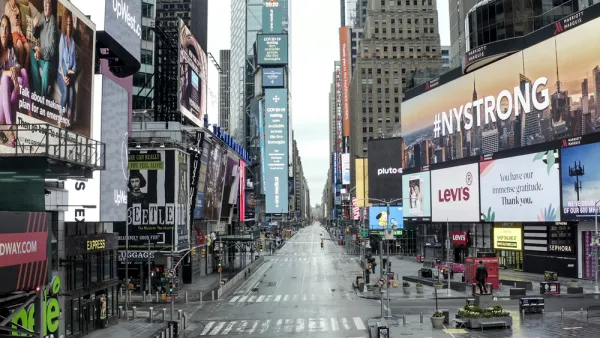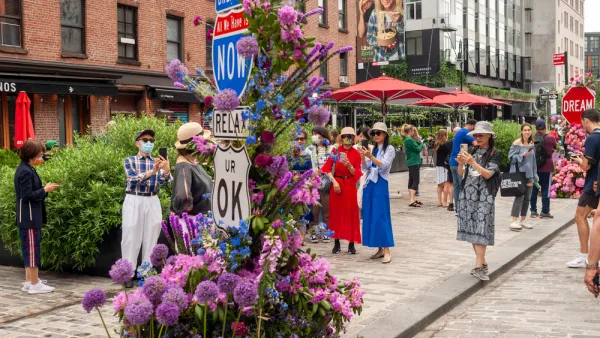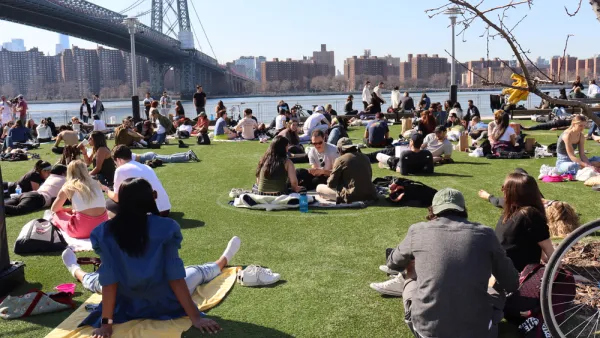At the onset of the pandemic, certain media figures were quick to jump on the bandwagon of anti-urbanism. While many of the anti-urban predictions failed to come about—neither did the problems of cities disappear.

Emily Badger writes to evaluate the lessons from one of the pandemic's most persistent and frequently fraught debates: Will the Covid 19 pandemic destroy the urban way of living in the United States?
From the outset of the pandemic, many took to the pages of mainstream media and social media to cast blame and predict dire consequences. "The pandemic promised nothing short of the End of Cities, a prophecy foretold by pundits, tweets and headlines, at times with unveiled schadenfreude," writes Badger.
Planetizen scrambled to keep up with the narrative at the beginning of the pandemic, gathering the discussion of pandemic planning and the consequences of Covid-19 for cities in a regular compendium. The discussion about the "End of Cities" frequently found its ways into our headlines.
- Debating the Future of Cities, and Urban Density, After the Pandemic (March 2020)
- Density Debate Rages Alongside the Pandemic (April 2020)
- The Media Can't Stop Talking About the End of Cities (September 2020)
Why was this prediction so alluring, asks Badger? To get at an answer, Badger and the team at The Upshot asked more than a dozen historians, economists, sociologists and urban policy experts about the staying power of the End of Cities narrative and about the "deep-rooted discomfort — suspicion, even — about urban life in America."
Experts cited in the story include:
- Eric Klinenberg, a sociologist at N.Y.U.
- David Schleicher, a Yale Law School professor
- David Madden, a sociologist at the London School of Economics
- Sara Jensen Carr, a professor of architecture, urbanism and landscape at Northeastern University
- Jason Barr, an economist at Rutgers
- David Albouy, an economist at the University of Illinois at Urbana-Champaign
One of the respondents say anti-urbanism is an American religion. Another says urban residents who left the city turned their story into a self-fulfilling prophecy. "'Cities are over,' in other words, is a convenient conclusion if you have decided they are over for you," writes Badger.
Importantly, Badger includes the insight of Madden, who points out that even urban boosters are making similar mistakes of bias.
"'The opposite of the decline narrative is a kind of urban boosterism which holds that after the pandemic, the dominant urban growth model of the past 15 years or so can continue, with a few tweaks here or there,' wrote Professor Madden, at the London School of Economics. That would be mistaken, too…"
All the pre-existing problems of expensive, unequal cities remain, and many have been exacerbated in ways that have not yet become apparent.
"In the end, the challenges of cities will persist, just as cities themselves will. And it seems to be folly to imagine away either," writes Badger.
FULL STORY: Covid Didn’t Kill Cities. Why Was That Prophecy So Alluring?

Analysis: Cybertruck Fatality Rate Far Exceeds That of Ford Pinto
The Tesla Cybertruck was recalled seven times last year.

National Parks Layoffs Will Cause Communities to Lose Billions
Thousands of essential park workers were laid off this week, just before the busy spring break season.

Retro-silient?: America’s First “Eco-burb,” The Woodlands Turns 50
A master-planned community north of Houston offers lessons on green infrastructure and resilient design, but falls short of its founder’s lofty affordability and walkability goals.

Test News Post 1
This is a summary

Analysis: Cybertruck Fatality Rate Far Exceeds That of Ford Pinto
The Tesla Cybertruck was recalled seven times last year.

Test News Headline 46
Test for the image on the front page.
Urban Design for Planners 1: Software Tools
This six-course series explores essential urban design concepts using open source software and equips planners with the tools they need to participate fully in the urban design process.
Planning for Universal Design
Learn the tools for implementing Universal Design in planning regulations.
EMC Planning Group, Inc.
Planetizen
Planetizen
Mpact (formerly Rail~Volution)
Great Falls Development Authority, Inc.
HUDs Office of Policy Development and Research
NYU Wagner Graduate School of Public Service




























